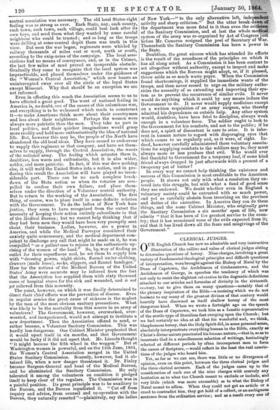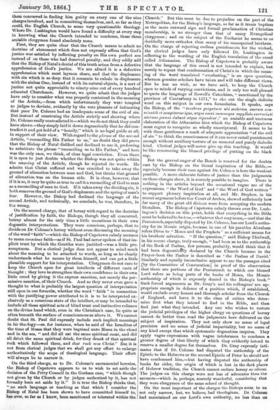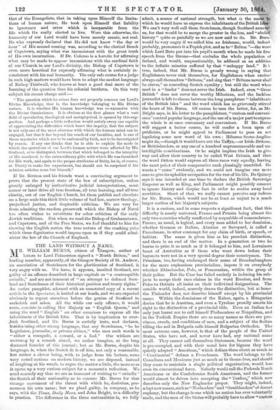CLERICAL JUDGES.
OUR English Church has now an admirable and very instructive illustration of the calibre and value of clerical judges sitting to determine questions of heresy. Nine charges, involving a great variety of fundamental theological principles and difficult questions of interpretation, were brought against the Bishop of Natal by the Dean of Capetown, the Archdeacon of Grahamstown, and the Archdeacon of George, in speeches the tendency of which was not only to resist the slightest relaxation in the dogmatic definitions attached to our articles and formulas of divinity in the sixteenth ceutury, but to give them on many questions—notably that of the plenary inspiration of the Bible—a maiming which we do not hesitate to say many of the greatest divines of that century would heartily have disowned as itself shallow heresy of the most dangerous kind. When we wrote a fortnight ago on the speech of the Dean of Capetown, we took him as a fanatic representative of the sterile type of literalism fast creeping upon the Church ; but we had certainly no idea at all that his wonderful and, we think, blasphemous heresy, that the Holy Spirit did, in some personal sense, absolutely interpenetrate everything human in the Bible, exactly as Christ's divine nature penetrated his human nature,—that is, so as to incarnate God in a miscellaneous selection of writings, hesitatingly selected at different periods by often incompetent men to form the canon of Scripture, —would reflect in the least the real convic- tions of the judges who heard him. Yet, as far as we can see, there was little or no divergence of opinion, even on this point, between the three clerical judges and the three clerical accusers. Each of the judges came up to the consideration of each one of the nine charges with scarcely any hesitation as to what the Church meant to exclude or include, and very little (which was more excusable) as to what the Bishop of Natal meant to affirm. When they could not get an article or a creed to contradict him, they got hold of a collect, or an ambiguous sentence from the ordination service; and as a result every one Of
them concurred in finding him guilty on every one of the nine charges involved, and in committing themselves, and, so far as they could, the English Church, to some very questionable theology. Where Dr. Lushington would have found a difficulty at every step in knowing what the Church intended to condemn, these three amiable clergymen found absolutely none.
First, they are quite clear that the Church means to admit no doctrine of atonement which does not expressly affirm that God's justice was satisfied by inflicting penalty on His own perfect son instead of on those who had deserved penalty, and they oddly add that the Bishop of Natal's denial of this truth arises from a defective apprehension of God's justice. We are afraid it is a defective apprehension which most laymen share, and that the displeasure with sin which is so deep that it consents to exhale in displeasure with the sinless One, instead of with its natural objects, is a sort of justice not quite appreciable to ninety-nine out of every hundred educated Churchmen. However, we quite admit that the judges have only to consider what was properly contained in the meaning of the Article,—from which unfortunately they were tempted as judges to deviate, evidently by the rare pleasure of intimating that poor Dr. Colenso had an inadequate sense of the evil of sin. But instead of construing the Article strictly and showing where Dr. Colenso really contradicted it—which we do not think they could have shown—they simply laid it down dogmatically that he did con- tradict it and got hold of a "homily," which is no legal guide at all, in support of their view. With regard to the phrase of the second Article, "reconciling His Father to us," no doubt they did prove that the Bishop of Natal disliked and declined to use it, preferring to substitute the phrase "reconciling us to His Father," and here was the only case, we think, of clear legal conviction. Even there it is open to just doubts whether the Bishop was not quite within the meaning of the Article, though he rejected its words. He admits that Christ suffered and was crucified to take away the ground of alienation between man and God, but thinks that ground of alienation was on the human side. It is clear, however, that if it is so, it may be quite as true to call it a reconciling of God to man as a reconciling of man to God. If it takes away the dividing sin, it both removes the ground of God's displeasure and the spring of man's fear. However, the Bishop had declined the language of the second Article, and technically, we conclude, he was, therefore, in the wrong.
On the second charge, that of heresy with regard to the doctrine of justification by faith, the Bishops, though they all concurred, betray almost for the only time a little uneasiness in their own dogmatic interpretations. They were conscious, perhaps, that to decide on Dr. Colenso's heresy without even discussing the meaning of the word "faith"—which the Bishop of Capetown calmly assumes to mean conscious faith—as if St. Paul had never spoken of that im- plicit trust by which the Gentiles were justified—was a little pre- sumptuous. But a clerical judge does not appear to mind much about the meaning to be attached to words, so long as he clearly understands what he means by them himself, and can get a little plausible support for his interpretation. Clergymen do not care to keep the Church open for great intellects of different casts of thought ; they love to strengthen their own confidence in their own 'little creed by giving it the express sanction, not merely the per- missive sanction, of their Church. And so they never even gave a thought to what is probably the largest question of interpretation still open in our formulm, whether the word " faith " in connection with the justifying power attributed to it is to be interpreted ex- clusively as a conscious state of the intellect, or may be intended to include all those spiritual acts of blind trust and instinctive reliance on the divine hand which, even in the Christian's case, lie quite as often beneath the surface of consciousness as above it. We cannot doubt that St. Paul did expressly include such implicit meanings in his theology—as, for instance, when he said of the Israelites of the time of Moses that they were baptized unto Moses in the cloud and in the sea, "and did all eat the same spiritual meat, and did all drink the same spiritual drink, for they drank of that spiritual rock which followed them, and that rock was Christ." But it is not from clerical judges that we shall get any effort to enlarge authoritatively the scope of theological language. Their effort will always be to narrow it.
On the third charge, as to Dr. Colenso's sacramental heresies, the Bishop of Capetown appears to us to wish to set aside the decision of the Privy Council in the Gorham case, "which though not given by the Church or by judges authorized by it, has not formally been set aside by it." It is true the Bishop thinks that, "no such language or teaching as that which I consider the Bishop of Natal has been shown to have committed himself to, has ever, so far as I know, been sanctioned or tolerated within the
Church." But this must be due to prejudice on the part of the Metropolitan, for the Bishop's language, so far as it treats baptism as the mere outward sign and formal proclamation of Christian membership, is no stronger than that of many Evangelical clergymen ; and on the subject of the Eucharist he seems to us decidedly more orthodox than many of his unsuspected brethren. On the charge of rejecting endless punishments for the wicked, the clerical judges have only followed Dr. Lushington in adhering to the wording of the English translation of the creed called Athanasian. The Bishop of Capetown is probably aware that the language of this creed is not intended to explain, but merely to repeat that condemnation of Christ's in which the mean- ing of the word translated "everlasting," is an open question, whereon genuine scholars have taken and will take different views. But he has no wish, as we have said, to keep the Church open to minds of varying convictions, and is only too well pleased to quote the language of Nowell's Catechism, "sanctioned by the province of Canterbury in 1571," to eke out the single definite word on this subject in our own formularies. It speaks, says the Bishop, of the " tenebras perpetuas ubi seclerum suorum con- scimatid et sempiterno igne,atque omni summoque suppacio excruciati teternas pwnas dabunt at gee dependent ;" an amiable and unctuous elaboration of the Athanasian hint which the Bishop of Capetown must regret to recognize as wholly unscriptural. It seems to be with these gentlemen a mark of adequate appreciation "of the evil of sin" to think the consciousness of it can never entail punishment enough without auxiliary torture of an unmoral and purely diabolic kind. Clerical judges will never give up this teaching. It would be like renouncing the blessed privilege of putting on the black cap.
But the gravest anger of the Bench is reserved for the doubts cast by the Bishop on the literal inspiration of the Bible,— especially because their case against Dr. Coleus° is here the weakest possible. A more elaborate failure of justice than the judgments on these charges show, it is scarcely possible to imagine. There is nothing in the articles beyond the occasional vague use of the expressions, "the Word of God' and "the Word of God written" to support plenary inspiration at all, and Mr. Stephen, in his recent argument before the Court of Arches, showed sufficiently how far many of the great old divines were from accepting the modern literalism. The Bishop of Capetown calmly throws over Dr. Lush- ington's decision on this point, holds that everything in the Bible must be believed to be true,—whatever that may mean,—and that the Pentateuch, especially disputed by Dr. Colenso, has our Lord's autho- rity for its Mosaic origin, because in one of his parables Abraham refers Dives to "Moses and the Prophets" as a sufficient means for his brothers' salvation. "If the question," said Bishop Thirlwall, in his recent charge, truly enough, "had been as to the authorship of the Book of Psalms, few persons, probably, would think that it had been dogmatictly declared by the Church because in the Prayer-book the Psalter is described as 'the Psalms of David.' Similarly and equally inconclusive appear to me the passages cited [by the Committee of Convocation] in proof of the observation that there are portions of the Pentateuch to which our blessed Lord refers as being parts of the books of Moses, the Mosaic authorship of which is expressly denied in the Bishop's book." Such forced arguments as Dr. Gray's and his colleagues' are ap- propriate enough in defence of a position which, if established, would exclude every honest and thorough scholar from the Church of England, and leave it to the clam of critics who deter- mine first what they intend to find in the Bible, and then find just what they intended. Any one who wishes to restore the judicial privileges of the higher clergy on questions of heresy cannot do better than read the judgments here delivered on the subject of inspiration. They not only show no sense of legal precision and no sense of judicial impartiality, but no sense of any kind except that which systematic dogmatism inspires. They apply vague expressions with vague intolerance to condemn a greater degree of that liberty of which they evidently intend to reserve a smaller degree for themselves. Dr. Gray expressly inti- mates that if Dr. Colenso had disputed the authorship of the Epistle to the Hebrews or the second Epistle of Peter he should not have condemned him,—but having disputed the authorship of books far older, the origin of which is lost in the dark places of Hebrew tradition, the Church cannot endure heresy so odious. The judges-on this charge were not less of advocated than the accusers—which is, perhaps, scarcely wonderful, considering that they were clergymen of the same school of thought.
On the most important of the charges the Bishops seem to us not only narrow, but, we believe, bad theologians. Dr. Colenso had maintained on our Lord's own authority, no leas than on
that of the Evangelists, that in taking upon Himself the limita- tions of human nature, He took upon Himself that liability to ignorance and error which is inseparable from the life which He really elected to live. Were this otherwise, the humanity of our Lord would have been merely scenic, not real. He who expressly declared that He did not know "the day or hour" of His second corning was, according to the clerical Bench of Capetown, saying what was inconsistent with the great truth of His own incarnation. If Dr. Colenso is a heretic for affirming what may be made to appear inconsistent with the cardinal faith of our Church in our Lord's divinity, the Bishop of Capetown is even more heretical for expressly affirming what is certainly in- consistent with his real humanity. The only safe course for a judge in such high matters would have been to adopt the modest language of Bishop Thirlwall, who knows at least a good deal more of the learning of the question than his colonial brethren. On this very subject his recent charge said :— " The question which he raises does not properly concern our Lord's Divine Knowledge, that is, the knowledge belonging to His Divine nature. It is whether His human knowledge was co-extensive with the Divine Omniscience. It is obvious at the first glance what a vast field of speculation, theological and metaphysical, is opened by this sug- gestion. And perhaps a little reflection would satisfy every one capable of appreciating the difficulties which beset the inquiry, that the subject is not only ono of the most abstruse with which the human mind can be engaged, but that it lies beyond the reach of our faculties, and is one of those mysteries which are to be embraced by faith, not to be investigated by reason. If any one thinks that he is able to explain the mode in which the operations of our Lord's human nature were affected by His Godhead, or to distinguish between that which belonged to the integrity of His manhood, to the extraordinary gifts with which He was furnished for His work, and again to the proper attributes of Deity, he is, of course, at liberty to make the experiment, but should not be surprised if his solution satisfies none but himself."
If Mr. Buxton and his friends want a convincing argument to prove that the present state of the law of subscription, unless greatly enlarged by Ttuthoritative judicial interpretations, must sooner or later drive all true freedom, all true learning, and all true charity, out of our English Church, let them publish and circulate on a large scale this thick little volume of bad law, narrow theology, prejudiced justice, and despicable criticism. We are very far from admiring the random guesswork which the Bishop of Natal too often wishes to substitute for sober criticism of the early Jewish traditions. But when we read the Bishop of Grahamstown, and Capetown, and of the Free States, we feel thankful to him for showing the English nation the true nature of the crushing yoke which these dignitaries would impose upon us if they could admi- nister the law of the Church of England.
































 Previous page
Previous page